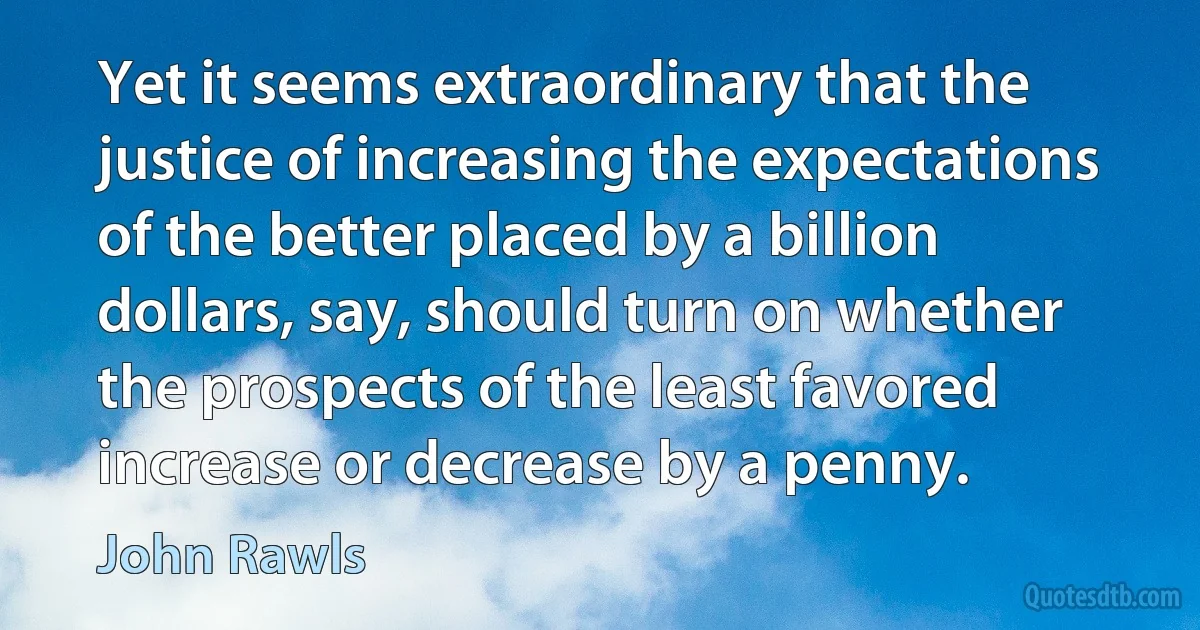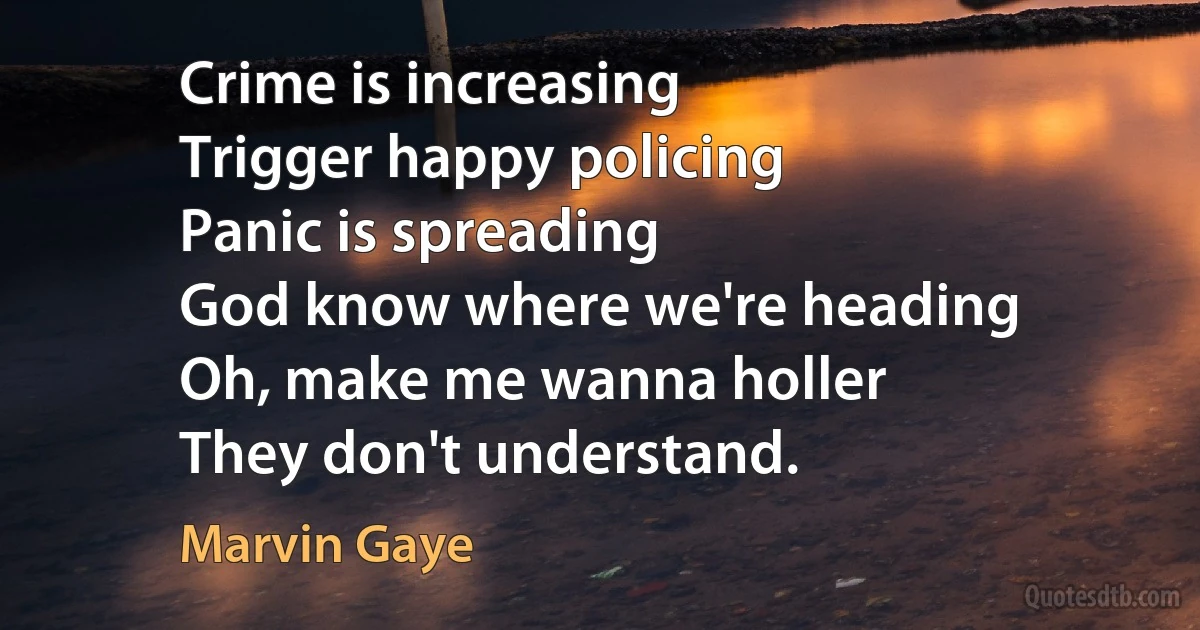Increasing Quotes - page 7
It is picked out from numbers progressing in continuous proportion. Of continuous progressions, an arithmetical is one which proceeds by equal intervals; a geometrical one which advances by unequal and proportionally increasing or decreasing intervals. Arithmetical progressions: 1, 2, 3, 4, 5, 6, 7, &c.; or 2, 4, 6, 8, 10, 12, 14, 16, &c, Geometrical progressions: 1, 2, 4, 8, 16, 32, 64, &c.; or 243, 81, 27, 9, 3, 1.

John Napier
That reform of the land laws, that abolition of the present system of entail, together with just facilities for the transfer of land, is absolutely necessary in order to do anything like common justice to those who inhabit the rural parts of this country, and whom, instead of seeing them, as we now see them, dwindle from one census to another, I, for my part, and I believe you, along with me, would heartily desire to see maintained, not in their present number only, but in increasing numbers over the whole surface of the land.

William Ewart Gladstone
...the practice of thrift is not one of the most distinguishing characteristics of the people of this country. It exists more beyond the border, in Scotland, undoubtedly, than it does in England, but it is increasing, and increasing very much, happily, in England itself. I rejoice to say that it has been in the power of the State to effect this by judicious legislation-not by what is called "grandmotherly legislation", of which I for one have a great deal of suspicion-but by legislation thoroughly sound in principle-namely, that legislation which like your savings bank, helps the people by enabling the people to help themselves.

William Ewart Gladstone
Capitalism subordinates men to machines instead of using machines to liberate men from the burden of mechanical and repetitive work. it subordinates all social activities to the imperatives of an incessant drive for individual enrichment in terms of money, instead of gearing social life to the development of rich individualities and their social relations. The contradiction between use-value and exchange-value, inherent in every commodity, fully unfolds itself in this contradictory nature of capitalist machinery. When capitalism is not overthrown once it has created the material and social preconditions for a classless society of associated producers, this contradiction implies the possibility of a steadily increasing transformation of the forces of production into forces of destruction, in the most literal sense of the word: not only forces of destruction of wealth (crises and wars), of human wealth and human happiness, but also forces of destruction of life tout court.

Ernest Mandel
I was obviously floating in the atmosphere; companioned not only by the strange child and the radiant pair, but by a constantly increasing throng of half-luminous, vine-crowned youths and maidens with wind-blown hair and joyful countenance. We slowly ascended together, as if borne on a fragrant breeze which blew not from the earth but from the golden nebulae, and the child whispered in my ear that I must look always upward to the pathways of light, and never backward to the sphere I had just left.

H. P. Lovecraft
I do not see that it is possible, nor can I discover that it would be right, for me now to withdraw from the cause in which I have so long taken so deep an interest. The work is great, and vast are the results depending upon it, and unhappily our laborers are not abundant...But conscious of the increasing hazard we run owing to the long continuance of monopolies, and beholding the appalling sufferings of multitudes of my fellow-creatures, and satisfied that all benevolence and charity and the teaching of religion and of schools fall short of much of their full effect owing to the degraded and impoverished condition of the people-I should feel myself guilty, as possessing abundance and leaving others to hunger, nakedness and immorality and deepest ignorance and crime, if I were to retire into domestic quiet and leave the struggle to be carried on entirely by others.

John Bright
Cultural systems will be treated as extensions of the power to learn, store, and transmit information, and the evolution of culture as dependent upon the biological development of these abilities and the cultural developments that actualize them. Man's increasing mastery over the natural world, with its increments of available energy use, can be seen from this point of view as one consequence of his capacity to learn, invent, borrow, store, and transmit the necessary technological and political inventions for the changes of scale involved in increasing utilization of energy. Instead of focusing attention on discontinuities - the invention of tool-making tools, the invention of agriculture, the invention of writing, and the invention of invention as a conscious pursuit-this discussion will focus on the continuities involved and on the extent to which older forms of communication, energy use, and social organization also undergo transformation in the course of cultural evolution.

Margaret Mead
Thus, we have three principles for increasing adequacy of data: if you must work with a single object, look for imperfections that record historical descent; if several objects are available, try to render them as stages of a single historical process; if processes can be directly observed, sum up their effects through time. One may discuss these principles directly or recognize the "little problems” that Darwin used to exemplify them: orchids, coral reefs, and worms-the middle book, the first, and the last.

Stephen Jay Gould
We are organization watchers in our role as citizens. Increasing attention has been fixed in recent years upon the functioning of society's organizations: its large corporations and its governments. Hence this could also be described as a book for Everyman–for it proposes a way of thinking about organizational issues that concern us all.

Herbert Simon
I'm very aware that this programme may be regarded as bleak or depressing - an increasing population with an ever decreasing supply of resources – but humans have capabilities that animals don't: to think rationally; to study; to plan ahead. The number of people on the planet depends on the personal decisions we each make regarding the number of children we have even setting aside the moral responsibility we have to protect other species, if we continue to damage our ecosystem, we damage ourselves. Its clear that we'll have to change the way that we live and use our resources. We're at a crossroads where we can chose to cooperate or carry on regardless. Can our intelligence save us? I hope so. m46s24-m47s15.

David Attenborough
This is the Earth - our planet, home to millions of different species, but only one species dominates everything - human beings. There are nearly seven billion of us living on the Earth, and the human population is increasing by more than two people every second; two hundred thousand people every day; nearly eighty million people every year. Each additional life needs food, energy, water, shelter, and hopefully a whole lot more. m0s0-m0s43.

David Attenborough
Both of these measures were on the side of increasing spendable income, though unfortunately they were largely without effect. The tax reductions were negligible except in the higher income brackets; businessmen who promised to maintain investment and wages, in accordance with a well-understood convention, considered the promise binding only for the period within which it was not financially disadvantageous to do so.

John Kenneth Galbraith
The decisive weakness in neoclassical and neo-Keynesian economics is not the error in the assumptions by which it elides the problem of power. The capacity for erroneous belief is very great, especially where it coincides with convenience. Rather, in eliding power - in making economics a nonpolitical subject - neoclassical theory destroys its relation to the real world. In that world, power is decisive in what happens. And the problems of that world are increasing both in number and in the depth of their social affliction. In consequence, neoclassical and neo-Keynesian economics is relegating its players to the social sidelines where they either call no plays or use the wrong ones. To change the metaphor, they manipulate levers to which no machinery is attached.

John Kenneth Galbraith
If the euro zone doesn't come up with a comprehensive vision of its own future, you'll have a whole range of nationalist, xenophobic and extreme movements increasing across the European Union. And, frankly, questions about the British debate on EU membership will just be a small sideshow compared to the rise of political populism.

Nick Clegg
In my judgment, the importance of the Crown in our Constitution is not a diminishing, but an increasing factor. It increases, and must increase with the development of those free, self-governing communities, those new commonwealths beyond the sea, who are constitutionally linked to us through the person of the Sovereign, the living symbol of Imperial unity.

Arthur Balfour
Recently in our country, there has been a steadily increasing number of people who dislike work and pursue leisure and extravagance. Almost everywhere individuals and organizations are fighting with resultant loss of energy that is needed for positive action. In order to save them from this situation, a principle of judo, based on the maximum efficiency concept should be applied as one aspect of modern society and as a natural result of the application of the principle of maximum efficiency, a mutual welfare and prosperity is believed to be the only effective way to ease and neutralize the forces among these individuals and organizations.

Jigoro Kano



